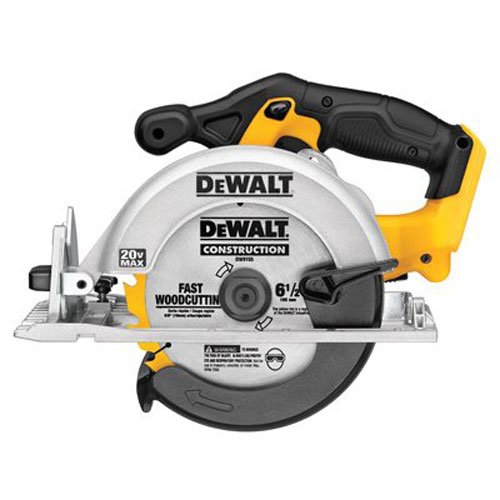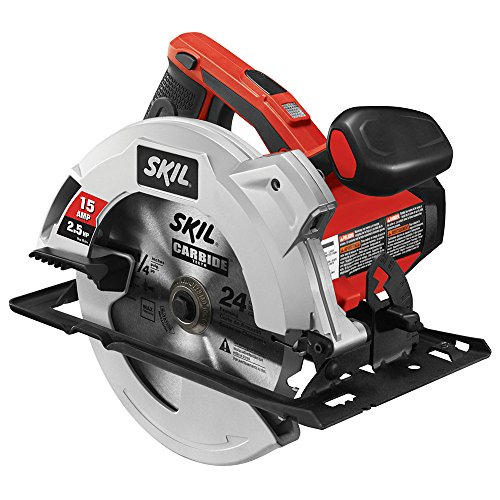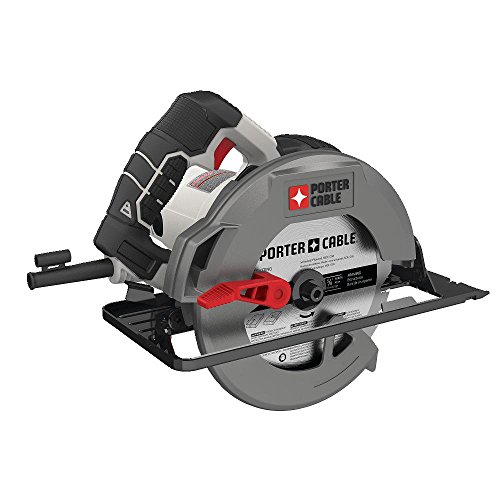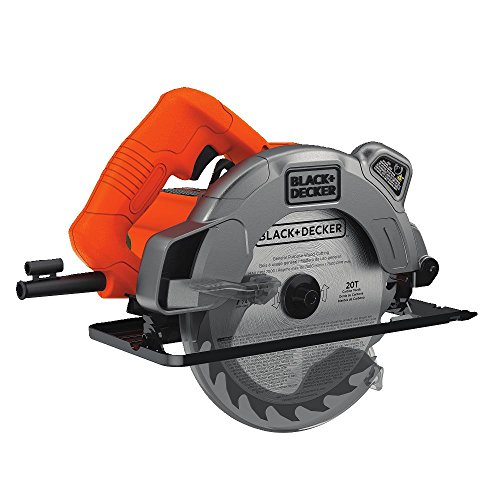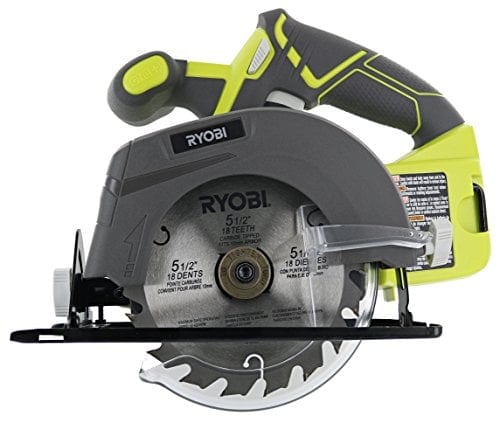Best Budget Circular Saws under $100 – Top Picks & Reviews 2025
-

- Last updated:
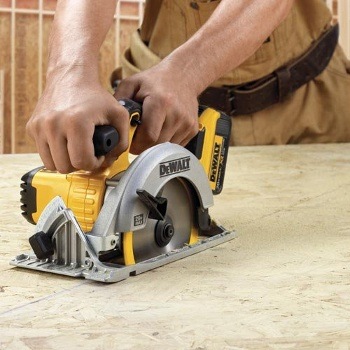

Circular saws are versatile tools that perform various tasks, but some models are too expensive for the average homeowner and DIYer. Unfortunately, the tool’s price can be a major barrier to your entry into woodworking.
A circular saw is a bread-and-butter tool that anchors every workbench, but talented crafters must go without one every day because they can’t afford the price of an overpriced product. Luckily, our reviews can help. We’ve collected our favorite circular saws that cost less than $100 to prove that you don’t have to blow your budget on a saw that’ll last.
A Quick Summary of Our Favorites in 2025
| Rating | Image | Product | Details | |
|---|---|---|---|---|
Best Overall
 |
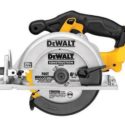 |
DeWalt DCS391B Circular Saw |
|
CHECK PRICE |

|
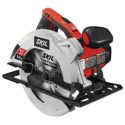
|
SKIL 5280-01 Budget Circular Saw |
|
CHECK PRICE |
Best Value

|
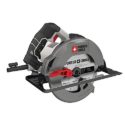
|
Porter-Cable PCE300 Circular Saw |
|
CHECK PRICE |
|
|
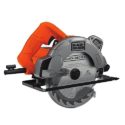
|
Black+Decker BDECS300C Circular-Saw |
|
CHECK PRICE |
|
|
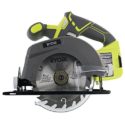
|
Ryobi One+ P505 Budget Circular Saw |
|
CHECK PRICE |
The 5 Best Budget Circular Saws:
1. DeWalt DCS391B Circular Saw – Best Overall
DeWalt is a brand that consistently outperforms in our tests, so we weren’t surprised to see them on top of this list once again. Their DCS391B circular saw boasts a motor capable of 5,150 RPM, a bevel capacity from 0 to 50 degrees, and a lightweight construction that makes it easy to balance and hold steady.
Need more convincing? In tests, this saw sliced through plywood and 2x4s with ease. We never had trouble holding a line due to the comfortable grip and loved how the extra depth made it easy to cut in tight spots. Then there’s the longevity: no matter the abuse it endures, the DCS391B runs for a long time.
Our only complaint relates to the power source and the price. For under $100, you can only get the corded version; the battery and charging kit cost about twice as much. This makes the DeWalt DCS391B less of a budget option than it seems at first, but we thought it was excellent even if you have to plug it in. Overall, the DCS391B is the best budget circular saw of this year.
- Comfortable to hold
- Ridiculously powerful
- Deep enough for sub-floor cutting
- Strong yet light
- Battery and charger are overpriced
- Doesn’t come with spare blades or a carry case
2. SKIL 5280-01 Budget Circular Saw
The SKIL 5280-01 circular saw has a deep 7½-inch blade and a 15-amp motor capable of 5,300 RPM while unloaded. Since it weighs just under 7 pounds, you can use it all day without feeling fatigued. We also like the dust blower that keeps the blade’s path free of sawdust and waste.
This saw has features we usually don’t see on products under $200, like a laser guide, onboard wrench storage, and the power to bevel from 0 to 51 degrees. It backs up all these perks with power, slicing cleanly through pressure-treated lumber while costing a fraction of our #1 pick.
The catch is adjustability. The depth on the DeWalt DCS391B is a cinch to change, but on the SKIL 5280-01, the adjustment handle is low-quality and often doesn’t work. The motor also isn’t up to snuff: it’s powerful but cuts in and out when running for more than 10 minutes without a rest. This saw is a sprinter, not a marathoner. Despite that, we still think the SKIL is one of the best budget circular saws we have reviewed this year.
- Powerful cuts
- Deep blade
- Easy to afford
- Laser guide and wrench storage included
- Depth is hard to adjust
- Motor sometimes cuts out
3. Porter-Cable PCE300 Circular Saw – Best Value
For a price this good, you’d expect the Porter-Cable PCE300 to be a shoddily-made circular saw you’d throw out after several projects. But for such a low price, the saw has incredible staying power. Based on what we observed, you could remodel an entire house using it, and it would still keep on spinning (at 5,500 RPM unloaded!).
The PCE300 is the best circular saw for the money we’ve found. It’s a bit heavy at 9½ pounds, but the steel shoe and the guides mean it isn’t hard to keep stable. The low price and durability are its main selling points, but it’s no slouch in the power department; it doesn’t just make cuts cleanly but also lines them up accurately.
However, it’s uncomfortably tricky to switch on, requiring you to jiggle the switch to get it going. We also saw some worrying signs of wear in the steel shoe after only a few tests.
- Budget price
- Lasts a long time
- Easy to stabilize
- Cuts line up well
- Heavy
- Steel shoe isn’t as durable as the rest of it
- Power switch often sticks
4. Black+Decker BDECS300C Circular-Saw
The Black and Decker BDECS300C is a solid saw for general-purpose woodworking. It comes with either an 18-tooth or 24-tooth blade, and if you buy it with both, they’re easy to change out using a spindle lock. It’s not available cordless, but it offsets that inconvenience with bonuses like a laser guide and wrench, not to mention an extended warranty.
When using the B&D BDECS300C, we found the laser sight did a fine job keeping us on our pencil marks, and the blade cut through 2x4s without any trouble in every direction. We didn’t have trouble with the blade, but we’ve heard from others who have, so we’d advise replacing it.
While most of it is well-constructed, the plastic guard over the blade is thinner than some of the plastic we used the blade to cut through. There’s also no guard on the trigger.
- Powerful motor
- Budget price
- Easy to replace blade
- Good warranty
- Corded power only
- Weak safety features
- Low-quality blade
5. Ryobi One+ P505 Budget Circular Saw
The Ryobi One+ P505 is a cordless circular saw you can get for an economical price. While it is on the bottom of our list—for reasons we’ll get to in a moment—it’s not a low-quality saw. With a rubber grip and extra side handle, you can hold it steady no matter where you’re using it, and it cuts straight without alignment features.
We don’t like that the rechargeable 18V battery and charger are sold separately, which can take a toll on the average budget. However, Ryobi’s batteries are high quality and hold their charge for a whole day.
Beyond that, the P505 just doesn’t go as far as the other saws on this list. It’s not as deep, its motor isn’t as powerful, and it can’t cut as quickly. If you think portability is worth paying extra for less power, this saw might work for you. If not, you’re better off looking for one higher on our list.
- Low price
- Straight cuts
- Easy to hold
- Batteries and chargers are sold separately
- Not very powerful
- Slow
- Only good for shallow cuts
Buyer’s Guide – Choosing the Best Budget Circular Saw
W’d rather see you get the right circular saw than the cheapest one. You might miss out, lose money, or harm yourself if the price is your only criterion. Check out this buyer’s guide to learn about the factors other than the cost you should consider when shopping for a circular saw.
Power Source
You have two options for your saw’s power source.
- Corded: A saw that must be plugged into work. Corded saws are usually larger, heavier, and more capable of handling tougher material. They’ll also never lose power in the middle of the job. However, you’ll need a generator if you can’t reach an outlet with an extension cord.
- Cordless: Cordless saws are lighter and less powerful, but you can take them anywhere. If you’re building in the woods or by the side of the road, a cordless saw is your only option. They’re almost always powered by rechargeable batteries.
Mechanical Style
Once again, you have two choices.
- Sidewinder: In these circular saws, the motor is set to the side of the blade, connected by a shaft. To identify a sidewinder at a glance, look for a handle set close to the blade and a little above. Sidewinders are lighter, more compact, and easier to hold over a long day’s work.
- Worm Drive: The motor on a worm drive saw sits behind the blade, connected by gears. Look for a handle set farther back, just behind a visible motor. Worm drive saws are heavier, and the pros prefer them for tougher jobs that require more torque, like cutting wet lumber, ripping logs, and sawing through concrete.
Power Rating
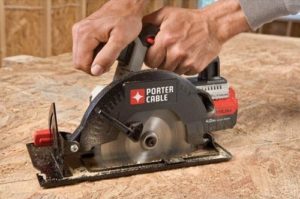
- Corded saws: 15A
- Cordless saws: 18V or 20V
The power rating is useful in only one way: if you see either kind of saw rated with a rating less than 15 amps or 18 volts, don’t buy it.
Blade
Like the power rating, the blade on a circular saw is less important than it seems. It’s the most detachable component of the tool, so if you don’t like the factory blade, it’s a piece of cake to replace it.
Instead of judging circular saws by their blades, look for how easy it is to change the blade out. Saws with spindle locks, like the Black & Decker BDECS300C, make blade replacements simple. Pick a carbide-tipped blade with at least 18 teeth when shopping for a replacement.
Shoe

Safety Features
The most important safety features to look for on a circular saw are the trigger safety, which prevents the saw from starting if it isn’t active, and the guard, which covers up as much of the blade as possible.
Trigger safeties should be positioned so you can release them and squeeze the trigger in a single motion. Guards should be thick enough not to break if struck or dropped. No amount of built-in safety can substitute for common sense. Always wear hand and eye protection, and pay attention to what you’re doing.
Adjustments
Two features are adjustable on circular saws: the depth and bevel angle.
- Depth indicates the thickness of the material the saw can cut through. 5½ inches through 7¼ inches is the usual range.
- The bevel angle determines how much the shoe can tilt for bevel cuts. Most adjustable bevel saws will range from 0 to 50 degrees.
Comfort
This is often overlooked, but after 5 hours of cutting, we guarantee you won’t be thinking of anything else. It’s primarily dependent on the saw’s weight and handle ergonomics.
- Weight: You’ll want the weight to be proportional to your weight. If you’re 100 pounds wet, you won’t be able to wield a 16-pound worm drive saw for long. Likewise, if you have 220 pounds of muscle, you’ll get pretty impatient with a 7-pound sidewinder.
- Handle: Make sure it’s pliable without being flimsy and conforms to your hand.
Conclusion:
The battle for the best circular saw under $100 was fierce between the DeWalt DCS391B and the SKIL 5280-01. Ultimately, the DeWalt won out. As hard as we looked, we simply couldn’t find any flaws with the saw. Our only real problem was how much more money you must shell out to go cordless.
Both these saws are powerful, fast, user-friendly, durable, and safe. The Skil only fell slightly short because of some issues with its depth adjustment and motor, though we’ll point out that it’s much cheaper. If you like acquiring products that provide the best value for money, we strongly recommend trying the Porter-Cable PCE300. The circular saw boasts of all the features you would find in a high-end model.
You may also be interested in reading our popular compact circular saw buying guide.
Related Reads:
Contents
